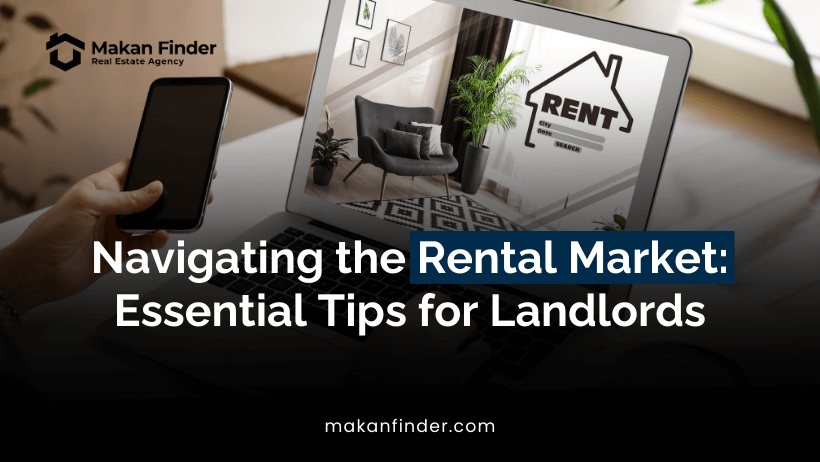Navigating the Rental Market
Determining the appropriate rental rates for your property can be made easier by conducting thorough research. Begin by reviewing online listings and house prices to gain insight into the rates charged by other landlords for similar properties.
To take this a step further, consider seeking advice from experienced local letting agents in Makan Finder. Their extensive knowledge of the area will help you secure the optimal rental income, striking a balance between attracting potential tenants and ensuring a fair return for you as the landlord. By conducting due diligence, you can maintain a competitive and profitable property.
Navigating the Rental Market: Essential Tips for Landlords
1. Understand local rental laws:
Familiarize yourself with the landlord-tenant laws and regulations in your area. This includes knowing the rules regarding security deposits, lease agreements, eviction procedures, and fair housing laws. Compliance with these laws is crucial to avoid legal issues.
2. Screen tenants thoroughly:
Implement a comprehensive tenant screening process to ensure you select reliable and responsible tenants. This process may include conducting background checks, verifying employment and income, checking rental history, and contacting references. This helps minimize the risk of renting to individuals who may cause problems or fail to meet their financial obligations.
3. Set competitive rental prices:
Research the local rental market to determine the appropriate rental prices for your properties. Consider factors such as location, property condition, amenities, and comparable rental rates in the area. Setting competitive prices increases your chances of attracting quality tenants while maximizing your rental income.
4. Use written lease agreements:
Always use written lease agreements to clearly outline the terms and conditions of the rental agreement. Include important details such as the duration of the lease, rent amount and due date, pet policies, maintenance responsibilities, and any specific rules or restrictions. Both you and the tenant should sign the lease to ensure mutual understanding and protection.
5. Maintain the property:
Regular maintenance is essential to keep your property in good condition and attract quality tenants. Promptly address repair requests and conduct regular inspections to identify any potential issues. Keep the property clean, well-maintained, and comply with safety standards. Providing a comfortable and safe living environment encourages tenants to stay longer and take better care of the property.
6. Communicate effectively:
Maintain open and clear communication with your tenants. Respond promptly to their inquiries, concerns, and repair requests. Establishing good communication helps build a positive landlord-tenant relationship and reduces misunderstandings or conflicts.
7. Handle finances responsibly
Keep detailed records of all financial transactions related to your rental properties. This includes rent payments, security deposits, maintenance expenses, and any other financial transactions. Use a reliable accounting system or software to track income and expenses. Also, establish a clear system for collecting rent and late fees, if applicable.
8. Stay updated on market trends
Continuously educate yourself about the rental market in your area. Stay informed about changes in rental laws, market trends, and property values. This knowledge helps you make informed decisions regarding rental prices, property upgrades, and investment opportunities.
9. Consider hiring a property manager:
If managing rental properties becomes overwhelming or if you own multiple properties, you may want to consider hiring a professional property management company. They can handle tasks such as tenant screening, rent collection, property maintenance, and dealing with legal matters. While it comes with a cost, it can save you time and provide expertise in managing your properties.
Remember, being a successful landlord requires dedication, attention to detail, and a proactive approach to property management. By following these tips and continuously improving your knowledge and skills, you can navigate the rental market more effectively and maximize the returns on your investments.
Benefit of Navigating the rental market as a landlord
Navigating the rental market as a landlord can bring several benefits. Here are some advantages of effectively managing your rental properties:
- Maximizing rental income: By understanding the local rental market and setting competitive rental prices, you can optimize your rental income. Charging the right amount ensures you attract quality tenants while maintaining profitability.
- Reducing vacancies: A thorough understanding of the rental market helps you minimize vacancies by attracting tenants quickly. Knowing market demand and pricing your rental units appropriately increases the likelihood of securing reliable tenants, reducing the time your property remains vacant.
- Selecting quality tenants: Navigating the rental market involves implementing a comprehensive tenant screening process. Thoroughly screening prospective tenants helps you select reliable individuals who are more likely to pay rent on time, take care of the property, and follow the lease terms. This reduces the risk of costly evictions and property damage.
- Maintaining property value: Staying informed about market trends and property values allows you to make informed decisions about property maintenance and upgrades. By keeping your rental property in good condition, you preserve its value and appeal to potential tenants.
- Building positive landlord-tenant relationships: Effective communication with tenants and prompt resolution of their concerns fosters positive relationships. Happy tenants are more likely to renew their leases and take better care of the property. Positive landlord-tenant relationships can lead to longer-term tenancies, reducing turnover costs.
- Legal compliance: Understanding rental laws and regulations in your area helps you stay in compliance and avoid legal issues. By following proper procedures for leases, security deposits, and eviction processes, you protect yourself from potential legal disputes and financial liabilities.
- Streamlining operations: Navigating the rental market involves implementing efficient systems for rent collection, maintenance requests, and record-keeping. By streamlining operations, you save time and effort, making property management more manageable and allowing you to focus on other aspects of your life or business.
- Capitalizing on investment opportunities: Being knowledgeable about the rental market enables you to identify investment opportunities. You can identify areas with potential rental growth, emerging markets, or properties with good return on investment. This knowledge helps you make informed decisions when expanding your rental portfolio.
Overall, effectively navigating the rental market as a landlord helps you optimize your rental income, attract quality tenants, and maintain the value of your properties. It also reduces risks, promotes positive relationships, and improves overall operational efficiency. These benefits contribute to the long-term success and profitability of your rental business.
Here are the key takeaways:
- Understand local rental laws and regulations to ensure legal compliance and avoid potential issues.
- Thoroughly screen tenants to select reliable and responsible individuals who are likely to fulfill their financial obligations and take care of the property.
- Set competitive rental prices based on market research to attract quality tenants while maximizing your rental income.
- Use written lease agreements to clearly outline the terms and conditions of the rental agreement, protecting both you and the tenant.
- Maintain the property in good condition to attract and retain tenants, conducting regular inspections and promptly addressing repair requests.
- Communicate effectively with tenants, responding promptly to inquiries, concerns, and repair requests to build a positive landlord-tenant relationship.
- Maintain accurate financial records and handle finances responsibly, including rent collection, security deposits, and expense tracking.
- Stay updated on market trends and property values to make informed decisions about rental prices, property upgrades, and investment opportunities.
- Consider hiring a property manager if managing rental properties becomes overwhelming or if you own multiple properties.
By implementing these strategies, you can navigate the rental market more effectively, minimize risks, and maximize the returns on your rental properties.





